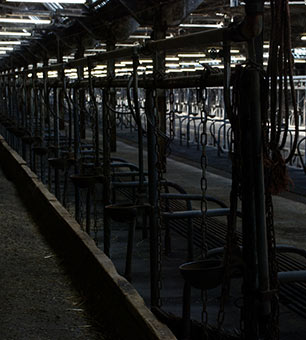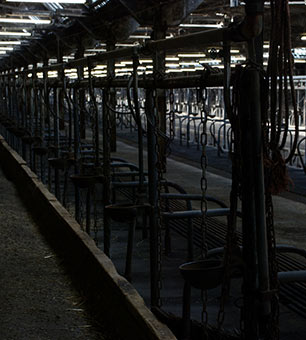 (Photo: ChaosHusky / Flickr)On Monday, June 22, the Center for Constitutional Rights appealed the dismissal of a federal lawsuit that bears my name, Blum v.Holder and challenges the constitutionality of the Animal Enterprise Terrorism Act (AETA). Last March, Judge Joseph L. Tauro dismissed the case because, he said, the plaintiffs “have not alleged any specific, actual harm suffered.” But I have been deeply harmed. The AETA explicitly punishes causing an “animal enterprise” to lose profits, and I have spent years living in fear that the more persuasively I tell the truth about the animal suffering that underpins so much of our daily lives, the more likely I am to get thrown in jail.
(Photo: ChaosHusky / Flickr)On Monday, June 22, the Center for Constitutional Rights appealed the dismissal of a federal lawsuit that bears my name, Blum v.Holder and challenges the constitutionality of the Animal Enterprise Terrorism Act (AETA). Last March, Judge Joseph L. Tauro dismissed the case because, he said, the plaintiffs “have not alleged any specific, actual harm suffered.” But I have been deeply harmed. The AETA explicitly punishes causing an “animal enterprise” to lose profits, and I have spent years living in fear that the more persuasively I tell the truth about the animal suffering that underpins so much of our daily lives, the more likely I am to get thrown in jail.
The ruling by the US District Court for the District of Massachusetts offers one very narrow interpretation of the statute and a hollow promise that the AETA will not be used to prosecute those engaging in first amendment protected speech – but I am not relieved. If the AETA exists only to prosecute activists who engage in criminal activity, as the court claims, then it needn’t exist at all. Ample state and federal laws already exist to prosecute those who damage property or engage in harassing or threatening behavior. What did not exist until the AETA was a way to rebrand effective advocacy on behalf of animals as terrorism. The court’s ruling allows the AETA’s labeling of nonviolent civil disobedience as a terrorist act and punishes those who trespass on factory farms and illegally liberate animals from horrific conditions orders of magnitude more severely than someone who steals or damages property for reasons other than animal rights.
Finally, Judge Tauro’s ruling is only one man’s opinion of the law. There is no reason to believe that other judges, or other prosecutors, will share Judge Tauro’s interpretation of the AETA as applicable to illegal activity only. Throughout American history, our laws have been interpreted in all manners, and in good and bad faith. The AETA was enacted in bad faith, at the behest of groups with telling names such as the National Cattlemen’s Beef Association and, like the ag-gag laws, aimed at silencing whistleblowers inside of factory farms and slaughter plants, it is designed to serve the corporations that lobbied for it. I have no confidence that, at the behest of those same corporate interests, I and my fellow activists would not be prosecuted for telling truths that depress their bottom line.
The Animal Enterprise Terrorism Act – the name speaks for itself. This is a law that epitomizes the current climate for social justice activism in America – one of systematic repression. By rebranding activism as terrorism, corporate interests have made it far too easy for some of our bravest activists to be locked away for years. In the past decade, I have seen many of my closest friends go to prison, including my co-plaintiff Lauren Gazzola. Not only were these activists punished for their successful advocacy, their sentences were intended as warnings to others like me – that we are right to be scared of laws like the AETA, and that we should sit down and be quiet.
But sitting down and being quiet in face of injustice – be it the injustice animals face daily on factory farms and in slaughter plants, or the injustice of creating a special class of criminality for activists who want to make a more humane world – isn’t the American way. Which is why, even after the disappointment of the court’s initial dismissal of Blum v. Holder, this week we file our appeal.
Join us in defending the truth before it’s too late
The future of independent journalism is uncertain, and the consequences of losing it are too grave to ignore. To ensure Truthout remains safe, strong, and free, we need to raise $50,000 in the next 10 days. Every dollar raised goes directly toward the costs of producing news you can trust.
Please give what you can — because by supporting us with a tax-deductible donation, you’re not just preserving a source of news, you’re helping to safeguard what’s left of our democracy.
